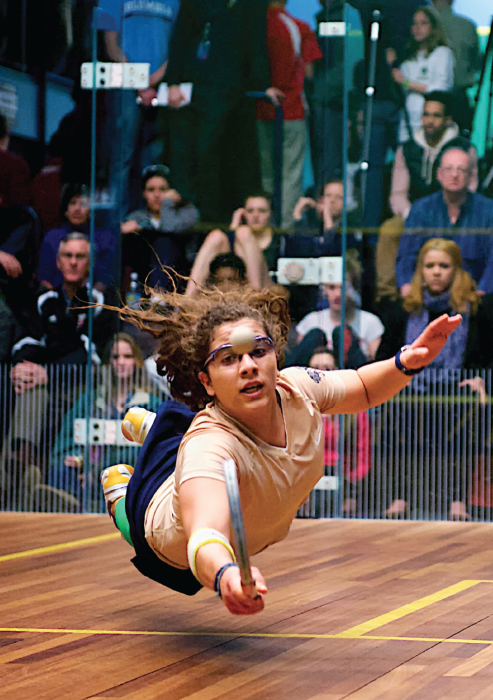
By Anne Bello
Certain names appear again and again in the College Squash Association’s championship history. By the time the 2012-2013 season was in the books, both the Harvard women and the Trinity men had recorded their fourteenth team championships. Harvard defeated Trinity 5-4 to win the Howe Cup, their third national title in four years. Trinity defeated Harvard 6-3 to win the Potter Cup, their fourteenth title in fifteen years.
Harvard’s Championship Haul didn’t stop with team competition: sophomore Amanda Sobhy won her second consecutive individual title, defeating Trinity’s Kanzy El Defrawy 3-0 to remain undefeated in intercollegiate play.
There was, however, one new name for the record books: Amr Khaled Khalifa, who won the men’s individual title 3-0 over Princeton’s Todd Harrity. Actually, make that two new names, as Khalifa’s win marked the first national title in the history of the St. Lawrence University squash program.
Khalifa’s win may also represent a major change for college squash. Historically, there have been individual champions from schools that have never been in the running for team titles. There have even been individual champions from schools that have not fielded teams. Khalifa’s win for St. Lawrence might seem like another blip in the record books, an outstanding player who landed outside the most dominant squash schools. But that assessment overlooks several factors. First, St. Lawrence is clearly a program on the rise. During the men’s team championships, the Saints proved that their first-ever A Division berth was no fluke by upsetting then-fifth-ranked Cornell in the consolation semifinals.
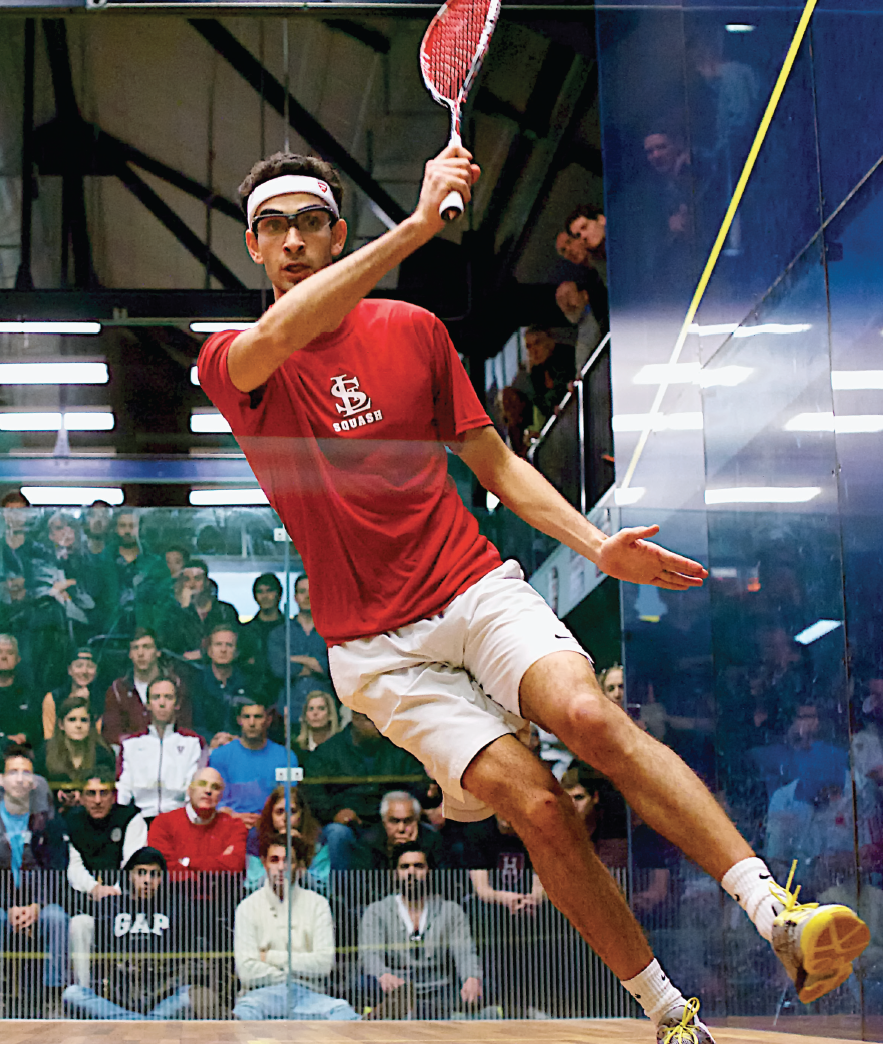
Second, the men’s A draw at the Individual Championships was the most competitive it has been in years. The quarterfinals saw a rematch of the 2011 title match, with Harrity taking out Cornell’s Nick Sachvie in three games. Also in the quarters, newcomer Ahmed Abdel Khalek of Bates took down 2012 finalist Ramit Tandon of Columbia in four.
Even with two former finalists out early, the level of play in the semifinals was unparalleled. After Abdel Khalek fell to Harrity in three, Khalifa faced defending individual champion Ali Farag of Harvard in a rematch of the 2010 World Junior title contest.”
“You haven’t gotten lost. This isn’t Grand Central,” Trinity head coach Paul Assaiante assured crowd members dazzled by Farag’s and Khalifa’s play in the epic five-game match. “This is still college squash.”
There have been countless dramatic matches in college squash history, and the 2012-2013 team championships provided more than a few of their own. There have been many talented, accomplished collegiate players. But in that semifinal match, Khalifa and Farag took the college game to another level.
The story of college squash the past few seasons has focused on growth, on the emergence of new club teams and new varsity programs.
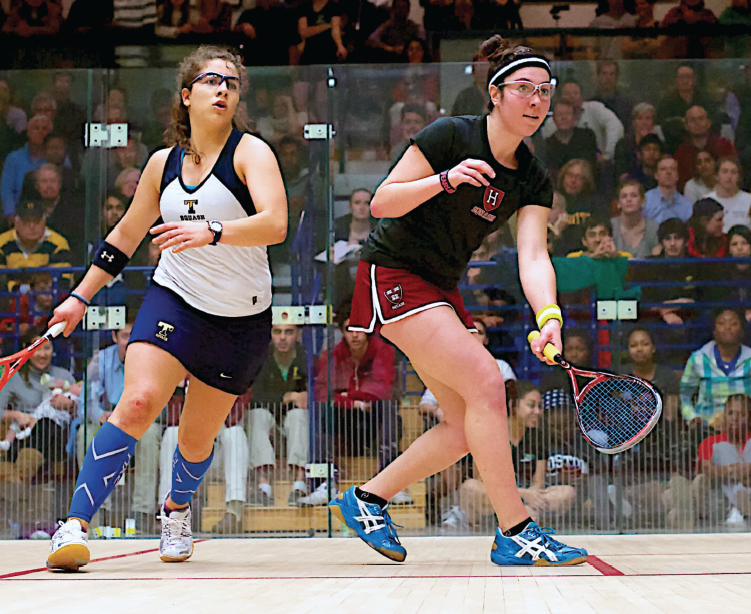
This season didn’t see a significant increase in the overall number of teams, but there was a noticeable improvement in the quality of play across all divisions. It was most obvious in the Khalifa-Farag match, but there were other signs: the jostling among the top teams in the women’s A Division; the increased parity through the bottom of the men’s A Division well into the B Division. Indeed, evidence of a higher standard of play could be seen in all divisions on both the women’s and men’s sides.
Take, for instance, the women’s E Division final between Ushashi Basu (Tufts) and Alex Love (Haverford). The two seniors duked it out through five games that got tighter and tighter as the match progressed, with Basu outlasting Love 15-13 in the fifth. Haverford, however, would go on to win the team match 6-3.
Traditionally, the women’s E Division has featured many players who are still developing basic squash skills. There have, of course, been competitive matches in the E Division before. But Basu and Love were playing points that were longer and more dynamic than have typically been seen in the division; this was not a case of two enthusiastic beginners having an equally difficult time with return of serve. These were two players locked in a contest that demanded skill and athleticism.
And this wasn’t a No. 1 match. Basu and Love played third in the order for their respective teams.
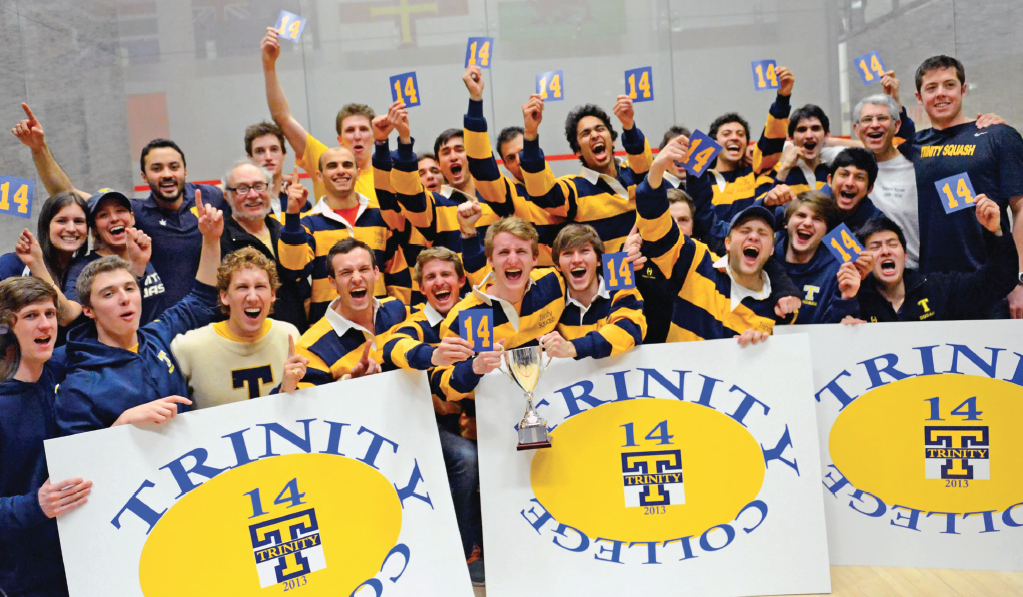
Last season saw the end of the story that had dominated college squash headlines for so many years: Trinity’s record-breaking winning streak. With the Trinity men and Harvard women back on top this year—and Sobhy cruising to another individual title—it may seem like things are back to business as usual for college squash. Perhaps we are in for another set of dynastic runs, the same programs with new sets of players racking up title after title.
Or, perhaps, we are transitioning into a new era of college squash, where each season a different group of teams has a legitimate shot at the national title.
That future is still a ways off. But thanks to the Khalifas and Abdel Khaleks, the Basus and Loves—to their coaches, schools, and teams—it may be a little closer.
2013 Women’s National Team Championships
Brady Squash Center, Yale University, February 15th-17th
The blizzard that struck the Northeast late in the college squash season added an element of mystery to the 2013 Howe Cup competition. The weather led to the cancellation of the regular season match between top-ranked Princeton and fourth-ranked Trinity. The two teams met for the first time in the semifinals, where the Bantams pulled out a 6-3 upset over the Tigers. Defending champions Harvard advanced to the final with a 6-3 win over Penn in the semis.
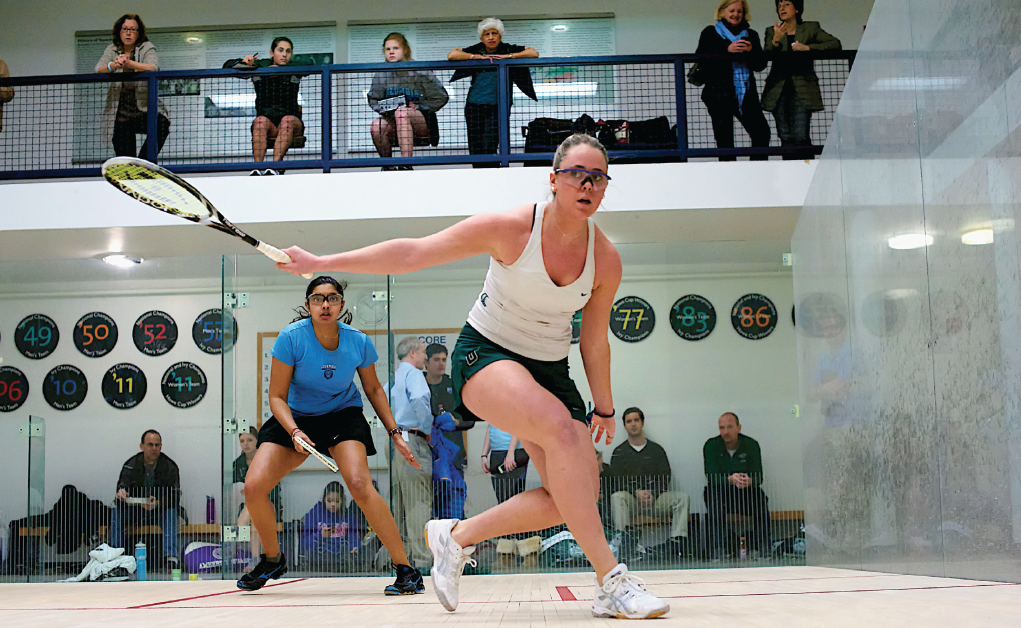
During the final, Harvard swept the first flight of matches to take an early 3-0 lead, but Trinity began to close the gap by winning two of the next three matches. By the final round, Harvard needed just one more match to clinch the national title, and they got it from Sobhy, who won in three over Trinity’s El Defrawy. Trinity would win the other two matches to bring the final score closer, but it was too late: Harvard had already claimed the 2013 national championship, winning 5-4.
2013 Men’s National Team Championships
Brady Squash Center, Yale University, February 22nd-24th
After the opening round of play, it looked like the stage was set for a rematch of the thrilling 2012 Potter Cup final as top-seeded Trinity and second-seeded Princeton both advanced 8-1. Then came the semifinals. Trinity sent Yale back to their dorms relatively quickly, winning 7-2, but Harvard was making things difficult for Princeton in the other semifinal. The momentum of the match swung wildly: at one point it looked like Harvard would clinch, but then Harrity upset Farag to keep the Tigers’ hopes alive. The match came down to the No. 4 contest between Princeton’s Dylan Ward and Harvard’s Gary Power. Down 0-2 in games to start, Power came back to win 11-7 in the fifth and send Harvard to the finals.
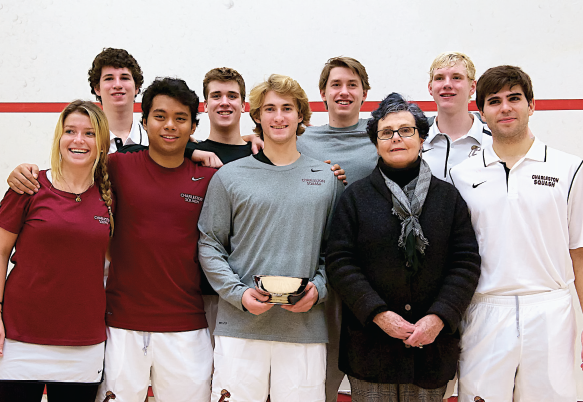
In the final, Harvard opened up a 2-1 lead after the first round of matches, but the match began to turn in Trinity’s favor during the second round, as the Bantams swept all three matches. Farag won for Harvard at No. 1, and Zeke Scherl (Harvard) forced a fourth game off Zeyad El Shorafy (Trinity) to keep the Crimson’s chances alive. El Shorafy regrouped and defeated Scherl in four, putting Trinity back on top as national champions. The final score was 6-3 to Trinity.
2013 Individual Championships
Kellner Squash Center, Yale University, March 1st-3rd
If there’s growing competitiveness throughout much of college squash, there was one notable exception: the women’s A Draw at individuals. Amanda Sobhy rolled to her second consecutive Ramsay Cup, holding most of her opponents to just a few points each game. If anyone was going to push Sobhy in collegiate play, it was her opponent in the Ramsay Cup final, El Defrawy of Trinity. El Defrawy has been the only player to win a game off of Sobhy in intercollegiate competition and, in the individual final, she pushed the third and final game to extra points. Still, Sobhy will remain the player to beat next season.

The men’s final saw the end to Harrity’s remarkable collegiate career, which included the 2011 individual title, the 2012 team title, and the 2013 doubles title. But it was Khalifa who stole the show, defeating the Princeton senior in three games to claim the 2013 Pool Trophy.
Madeleine Gill of Stanford won the Holleran Cup (women’s B Division), and Vivek Dinodia of Princeton won the Molloy Cup (men’s B Division).
Division Winners
Howe Cup (Women’s A): Harvard University
Kurtz Cup (Women’s B): Dartmouth College
Walker Cup (Women’s C): Bowdoin College
Epps Cup (Women’s D): William Smith College
E Division (Women): Haverford College
Emerging Teams: Vanderbilt University
Potter Cup (Men’s A): Trinity College
Hoehn Cup (Men’s B): University of Western Ontario
Summers Cup (Men’s C): Middlebury College
Conroy Cup (Men’s D): Stanford University
Chaffee Cup (Men’s E): Boston College
Serues Cup (Men’s F): New York University
Hawthorn Cup (Men’s G): College of Charleston
Women’s Award Winners
Richey Award (Senior player and sportswoman of the year): Pamela Chu (Stanford University)
Wetzel Award (Best women’s player to learn squash in college): Kathryn Brummer (Mount Holyoke College)
Chaffee Award (Team sportsmanship): Stanford University (head coach Mark Talbott)
Most Improved Team Award: Drexel University (head coach John White)
Men’s Award Winners
Skillman Award (Senior player and sportsman of the year): Chris Hanson (Dartmouth College) and Todd Harrity (Princeton University)
Sloane Award (Team sportsmanship): Bowdoin College (head coach Tomas Fortson) and Stanford University (head coach Mark Talbott)
Barnaby Award (Most improved team): Haverford College (head coach Niki Clement)





